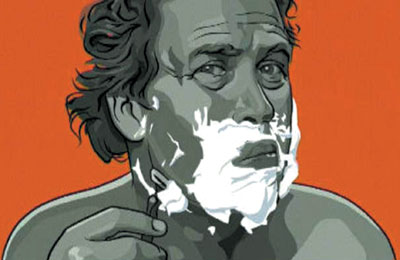PLANNED INTERFERENCE
Jørgen Leth and Lars von Trier's The Five Obstructions.
 |
Lars von Trier is not happy. “I am going to have to speak harshly. I am disappointed.” The object of his disaffection? None other than his cinematic mentor and hero, Jørgen Leth. The two have come together, at von Trier’s suggestion, to collaborate on a typically mischievous Danish film. Von Trier has asked Leth to remake — five times — Leth’s classic 1967 short The Perfect Human, according to arbitrary rules laid down by von Trier. The resulting documentary, The Five Obstructions, is a memorable study of egos and the art of filmmaking.
In The Five Obstructions Leth willingly subjects himself to von Trier’s “diabolical” dictates, which, as the camera records, are decided randomly by von Trier in meetings between the two legendary directors. In the first of the obstructions, von Trier decrees that no clip shall last more than 12 frames. When Leth returns weeks later with a mini masterpiece set in Cuba that vibrantly jumps to its own rhythm, von Trier declares: “The 12 frames were a gift!”
Poet, critic, sports commentator and Danish honorary consul in his second homeland of Haiti, Leth has made more than 40 films since 1963 and was one of the leading lights in Denmark’s 1960s experimental film movement. Leth is a passionate advocate of imposing rules on his own films, such as fixed cameras or completely chronological editing in documentaries, which he faithfully stuck to in his 1976 cycling epic A Sunday in Hell. While lecturing at the Danish Film School, he introduced the concept of self-imposed rules to a student — von Trier — and years later Dogme 95 was born. “Jørgen introduced rules of the game to my universe,” von Trier admits in The Five Obstructions.
In the second Obstruction film, Leth provokes von Trier’s ire by loosely interpreting a requirement that Leth film in the most hellish place on earth — but not show it. Leth heads to Bombay, where he is filmed dining in a tuxedo on a crowded street, watched by hungry-looking street children who stand behind a semi-transparent screen. Von Trier insists that they shouldn’t have been visible at all.
“You are my hero, there’s no doubt about it. But I have to punish you somehow,” von Trier tells Leth in the film. When he decides his punishment — that the third obstruction has to be made with no rules at all — Leth is visibly appalled.
“I felt he was trying to ruin my film. It was desperate,” he told an audience at the International Documentary Filmfestival Amsterdam. “He dumped me in an empty room. I felt instantly unhappy, having to remake a film considered a classic. I was really desperate.” As usual, though, Leth rises to the challenge, making a stylish film noir set in a Brussels hotel.
The humor and tension from The Five Obstructions comes from Leth’s determination to make a quality film despite von Trier’s equally strong determination to get him to make “a piece of crap.” “There’s a lot at stake in this film. If I couldn’t deal with his challenges, where would I be? I would look ridiculous,” Leth admitted. “It’s a test of wills. It’s also a test of different mind-sets and absolutely different ideas of how to create.” — Carol Nahra
Go back to the main article: Exterminating Angel.
VOD CALENDAR


 See the VOD Calendar →
See the VOD Calendar →


